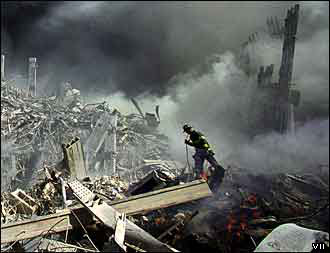Tuesday, March 07, 2006
Terrorism: The Danger within Other Dangers: Definitions
Second post in the 10 Greatest Dangers to the Western World series
Part 2a
 I had a conversation with a friend the other day, and eventually the conversation turned to the various dangers that face the world. I guess it’s a popular topic for me these days, what with spending so much of my time writing these articles.
I had a conversation with a friend the other day, and eventually the conversation turned to the various dangers that face the world. I guess it’s a popular topic for me these days, what with spending so much of my time writing these articles.
We turned to the question of why terrorism is so scary today, and the first answers were pretty standard: because a terrorist attack generally speaking targets non-combatants, innocent civilians that may even be sympathetic with the cause of the attackers; because an attack can happen at any time, in any place; and because the attackers have no morality, no conscience to dictate that their actions are wrong. But perhaps these attributes that we assign to terrorism are not 100%. And if we are going to combat terrorism, we need to know what we’re fighting.
Let’s turn back to those definitions we were looking at in the first Terrorism post. Kofi Annon said that “any deliberate killing of civilians for political purposes was terrorism”. This is a very broad definition, and could include a wide variety of actions that I don’t consider terrorism. The temptation is to just lump all immoral historical events into the broad term “terrorism”, but this will only prevent us from fully understanding the challenges we face today, and finding solutions to the prevent another catastrophe like 9/11 or the subway bombing.
According to this definition, I think you would have to consider many of the death sentences passed out the by US legal system to be terrorism. Many civilians have been killed in Iraq, and certainly the political aspirations tied in with that conflict are clear, but our war in Iraq is not terrorism as much as it is a military occupation. The destruction of the city of Hama by Syria and the killing of thousands of dissidents by Stalin’s government were horrible historical incidents, but they are not terrorism; rather, they are examples of dictatorships maintaining control militarily.
Now let’s examine to the definition found in the much narrower definition put forth by The Metropolis Times: “the murder of civilians and the destruction of property in order to provide fear in the population at large for political gains”. This narrows down the scope of terrorism quite a bit, and I’m partial to it because I believe that injecting fear into an otherwise peaceful society is a primary goal for terrorism (though we’ll hit on that later). But does it really define what’s occurring?
Once again, terrorist actions today all fit into this definition. Do the incidents we mentioned earlier? Death sentences would not be terrorism by this definition, fitting two, maybe three of the four criteria; death sentences are the murder of civilians, and while some are for political gain and others are to incite fear (fear against committing a particular crime), rarely do the two meet, and property is never destroyed. Iraq would not be terrorism by this definition, as the goal has never been to incite fear, but rather to effect change in governments.
On the flip side, Hama and Stalin’s murders may fall under this heading of terrorism. Stalin rarely destroyed property, while Hama was flattened, but both were cases of inserting fear into a society for political gains, and both involved a tremendous number of murders. So perhaps the definition still falls short, or perhaps these incidents should really be classified as terror.
David Brett points out that, regardless of the definition of terrorism that we adopt today, terrorism is now synonymous with “disturbing images of militants acting out in the name of Islam.” Certainly, this is the terrorism I set out to address with these posts. David uses the Encarta definitions for terror: “Political violence: violence or the threat of violence, especially bombing, kidnapping, and assassination, carried out for political purposes.” This definition brings up a great point in saying “the threat of violence”, since sometimes the threat of a terrorist activity is sufficient to halt a country in its tracks.
Again, this definition hints at, but does not actually point to, the motivation of injecting fear into a society, and I do believe this is at the heart of terrorism today. I know this is controversial to say, but most Muslims I know put a tremendous value on life, any life, and do not take it carelessly. They simply put a higher value on God and country. It’s why crime is not as big an issue in most Islamic countries as it is in most Western, secular countries. Many Muslims I know point to random killings as true barbarism, and would never imagine treating life with such disregard. Of course there are many exceptions to that statement, but many more people who fit into that mould.
So if there is this value on life in the majority of Muslim people, how can they commit these horrible acts? Part of it is a tactical military decision, and part of it is a growing frustration in the bleak conditions of their lives, and we’ll explore both of those issues later in this post. But part is the motivation to instil fear into our society, to make us fear the normal aspects of our everyday lives. Let me say that again: to make us fear the normal aspects of our everyday lives.
One of the most common misconceptions is that terrorists are going to attack packed stadiums, political rallies or other special events, but that never really does happen, does it? Think of an occasion where that has occurred. There was a bomb targeted for the Atlanta Olympics, but that’s the only special event I think of off the top of my head that was targeted. We say that’s because we beef up security so much for these events, but that is not in. The real reason these events aren’t targeted is that they are not part of our everyday lives.
Buses, subways, office buildings, discotheques, cafes, even a college campus, these are the common scenes of modern terrorism. They are the little events that make up our lives. And by causing us to fear these little events, terrorists are destroying the fabric of our society, slowly but surely!
And let’s add in the concept of the threat of terrorism. If the purpose of terrorism is to inject fear into the everyday activities of our life, then, assuming that destructive acts of terrorism are still fresh enough in people’s minds, the threat of terrorism can be as effective as terrorism itself. The mere threat of terrorism pushes the government to spend massive amounts of money bolstering security, convinces people not to travel or even not to leave their houses, and slow down those who do leave their homes as they experience heightened security. More often then not I think no terrorism was planned, but a bit of chatter can be a powerful weapon.
So let’s encapsulate this into one definition. Starting with the definition put forth by The Metropolis Times, and adding in the components I just mentioned, terrorism is the murder of civilians, the destruction of property, and the threat of murder and destruction in order to provide fear into the daily lives of the population at large for political gains. Further, if we want to describe the specific terrorism that this series of posts is addressing, we would simply change the end of that statement, “for political gains”, to “in the name of Allah”.
To me, this definition works. No longer is the destruction of the city of Hama an example of terrorism, as the actions weren’t meant to cause fear in people’s daily lives, but instead to cause a fear of speaking out against the government. The same is true of the Stalin administration’s actions. But it would cover all of the activities we normally think of as terror, and gets far closer to describing the motivations behind terrorism. You can draw your own conclusions, but I suspect this definition gets us closer than any other we’ll find. If you have a better one, please, put it forward!
technorati tags: terror, terrorism, Definition, Kofi Annan, Annan, Civilian, Murder, Bombing, Bus, Discotheque, Cafe, Subway, College Campus, 9/11, Office Building, Hama, Stalin, Death Sentence, Iraq, , Fear, Weapon
Terrorism: The Danger Within Other Dangers: Overview
10 Greatest Dangers to the Western World Series
The Conflict between the West and the Middle East
Posted by Scottage at 2:55 PM /
| |



 I had a conversation with a friend the other day, and eventually the conversation turned to the various dangers that face the world. I guess it’s a popular topic for me these days, what with spending so much of my time writing these articles.
I had a conversation with a friend the other day, and eventually the conversation turned to the various dangers that face the world. I guess it’s a popular topic for me these days, what with spending so much of my time writing these articles. 